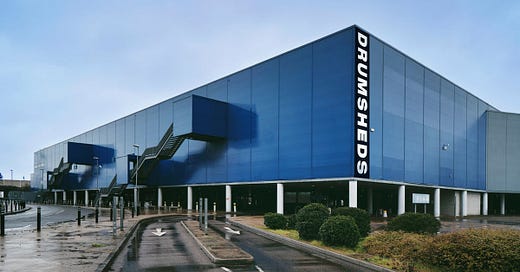Drumsheds in crisis: What's really going on at London's biggest nightclub?
The 15,000-capacity venue has been allowed to remain open after defeating efforts by the police to substantially cut its capacity following two drugs deaths.
Welcome back to the first London Centric edition of 2025. I’ve spent today at Enfield council, where the local authority has been debating the future of Drumsheds, London’s biggest nightclub.
The venue has been allowed to remain open for now, after defeating attempts by the police to massively reduce its capacity and impose heavy security requirements. The story speaks to the challenges at the heart of the capital’s nightlife, with legal and regulatory pressures combining with increased costs to create a toxic mix.
It also shines a light on Broadwick Group, an increasingly powerful business backed by money from the makers of Grand Theft Auto, who control an ever-growing number of venues across London.
Saturday 12 October was a big night at Drumsheds, the country’s largest club, which is located in a former IKEA near Meridian Water, north London. The 15,000-capacity venue was filled with people who had paid more than £50 to attend a massive drum and bass night celebrating a decade of events by promoter Worried About Henry, featuring 40 acts and headlined by Hybrid Minds. Then things started to go wrong.
With the evening in full swing, a 27-year-old man who had taken drugs was treated in Drumsheds’ on-site medical facility. What happened next is unclear, although he was allowed to return to the dancefloor. Some time later the same man returned to the medical treatment room and was taken to the nearby North Middlesex Hospital in a private ambulance, along with three other Drumsheds attendees that night. The 27-year-old later died in the hospital, while another hospitalised clubber required intensive care.
According to the Metropolitan Police, the death of the man was not reported to the authorities on the night, which led to their response and subsequent investigation being delayed. They said it was worrying that a clubber seeking medical treatment due to the effect of drugs had been allowed back into the event “instead of taking him to hospital or arranging for him to leave the venue”.
According to an account by police constable Francis Peters, who asked for the Drumsheds’ premises licence to be reviewed, this was part of a pattern of lawlessness at the venue.
In November officers were called following a knifing inside Drumsheds during a night headlined by Jamie Jones. The victim was left with “several lacerations over his body” but Drumsheds’ security staff “were uncooperative” with police on the night. Peters said officers considered shutting the entire club down that evening but ultimately decided to let it continue “due to the size of the crowd and the lack of resources” to safely disperse them.
Then during a night headlined by Bicep on 7 December, a 29-year-old woman died after allegedly bringing MDMA into the premises and heading to the toilets where she mixed the drug into a can of fizzy drink and drank the concoction through a straw. She was later found by Drumsheds’ medical team, taken to the medical facility, then transferred to hospital where she died shortly afterwards. Another clubber was hospitalised the same evening after taking something called a “multi-mushroom pill”.
The police concluded that there was “poor searching of customers at the venue” which allowed drugs to be easily brought inside, linked to the “sheer logistical problem of searching 15,000 people” on their way in. They said that “hundreds of thousands of people have been to venues across London over the last two months, and there have been no reported drug deaths apart from the ones at Drumsheds”. In a bid to stave off closure, the venue offered to do “anything” to remain open — resulting in extra-strict security checks that left people queuing for hours to get in to the following weekend’s event, setting off a round of negative press.
What most of the thousands of people queuing to get in probably didn’t know was that, in a quirk of licensing rules, the night out that was likely to cost them hundreds of pounds wasn’t at a venue owned by a private company but by a registered charity called Nine Point Eight.
Keep reading with a 7-day free trial
Subscribe to London Centric to keep reading this post and get 7 days of free access to the full post archives.





